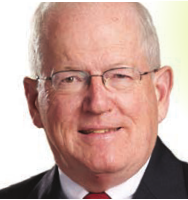Joe McQuaid’s profile of the late Union Leader publisher is enlightening
Joseph W. McQuaid, retired publisher and editor of the NH Union Leader, has written two books since retiring. Released just after Christmas, his latest, a profile of his late employer, William Loeb, is entitled, “William Loeb and His Times: Provocative Publisher, Private Paradox.” It should be required reading for anyone familiar with or interested in New Hampshire politics and history.
(McQuaid’s other book last year, “Signe’s Story,” published privately, was a touching love letter to his late wife. It is tender, funny and loving.)
McQuaid, along with his father, B.J. McQuaid, founder and publisher of the New Hampshire Sunday News, and his daughter and son, who followed him working for the papers, have been associated with the Manchester papers approximately twice as long as Loeb was. However, it was Loeb who brought the most attention to the papers by being such a controversial figure, due to his unfiltered style and personal attacks on political figures.
McQuaid might be expected to have produced a fawning biography of the man who owned the paper for which he worked or an apologetic work trying to explain Loeb’s tactics or somehow defend them. He does neither.
There are things in this book which people who admired Loeb will like, and much for those who opposed him to cite as well.
Loeb was Teddy Roosevelt’s godson, as his father was TR’s secretary, before going on to a successful government and business career. Growing up in Oyster Bay, Long Island, Loeb had every advantage and, McQuaid reports, failed to take advantage of many, being rather a spoiled young man who struggled with his education and lived at home later than most.
McQuaid traces Loeb’s young life to the Harvard Law School, which he was forced to leave when a scandal developed involving his first marriage. Loeb was married three times, and each involved one type of tacky scandal or another. Ultimately, apparently due to her disapproval of his exploits, Loeb’s mother disinherited him.
Young Loeb was involved in many progressive causes of the 1930s, and it is not clear whether he joined Communist organizations or was duped by them, although later in life he claimed to have “infiltrated” such organizations without joining or being an agent of the government. McQuaid is skeptical.
The book provides a valuable history of the Manchester newspapers. There are profiles of Frank Knox, whose widow sold the newspaper to Loeb in 1946, various other owners as well as the McQuaids, involved in founding the Sunday News. Loeb ran the paper until his death in 1981.
McQuaid chronicles Loeb’s most famous rows with politicians, state and national, the latter largely involving the presidential primary. From calling General Eisenhower “Dopey Dwight” to his on-again, off-again support of Richard Nixon, his steadfast support of Ronald Reagan, or his quixotic support of Los Angeles Mayor Sam Yorty or Pat Buchanan, Loeb was more effective in attacking others than in supporting candidates.
McQuaid paints a full picture of the Muskie campaign in 1972, when the candidate allegedly cried in front of the Union Leader building, in a snowstorm, after Loeb had published a letter alleging Muskie called French-Canadian Americans “Canucks.” He does a good job of pointing out how little journalistic integrity was involved, with no one checking the authenticity of the letter, which was very suspect in timing and content. He is blunt in his reporting of other ethical lapses.
In New Hampshire politics, there are descriptions of Loeb’s relationships with Senator Stiles Bridges and his widow, Congressmen Cleveland and Wyman, Governors Powell, Peterson and Thomson, and others. Loeb’s private and sometimes changing opinions of “his” candidates is enlightening.
McQuaid states the book is about Loeb and not Joe McQuaid. He does a good job of keeping to that assignment, although one can only hope his next book will be about his half century or so at the paper. In this writer’s opinion, he gets a couple of things wrong in the book, namely litigation in which Loeb was involved with author Kevin Cash and in the true import of the ERISA litigation that cost Loeb part ownership of the paper.
McQuaid leaves it to readers to connect the dots about Loeb. But his descriptions of his failings as a son, father, husband and journalist are enough evidence to reach a conclusion: Joe McQuaid is a good reporter and a fine man. William Loeb wasn’t.
Brad Cook is a Manchester attorney. The views expressed in this column are his own. He can be reached at bradfordcook01@gmail.com.